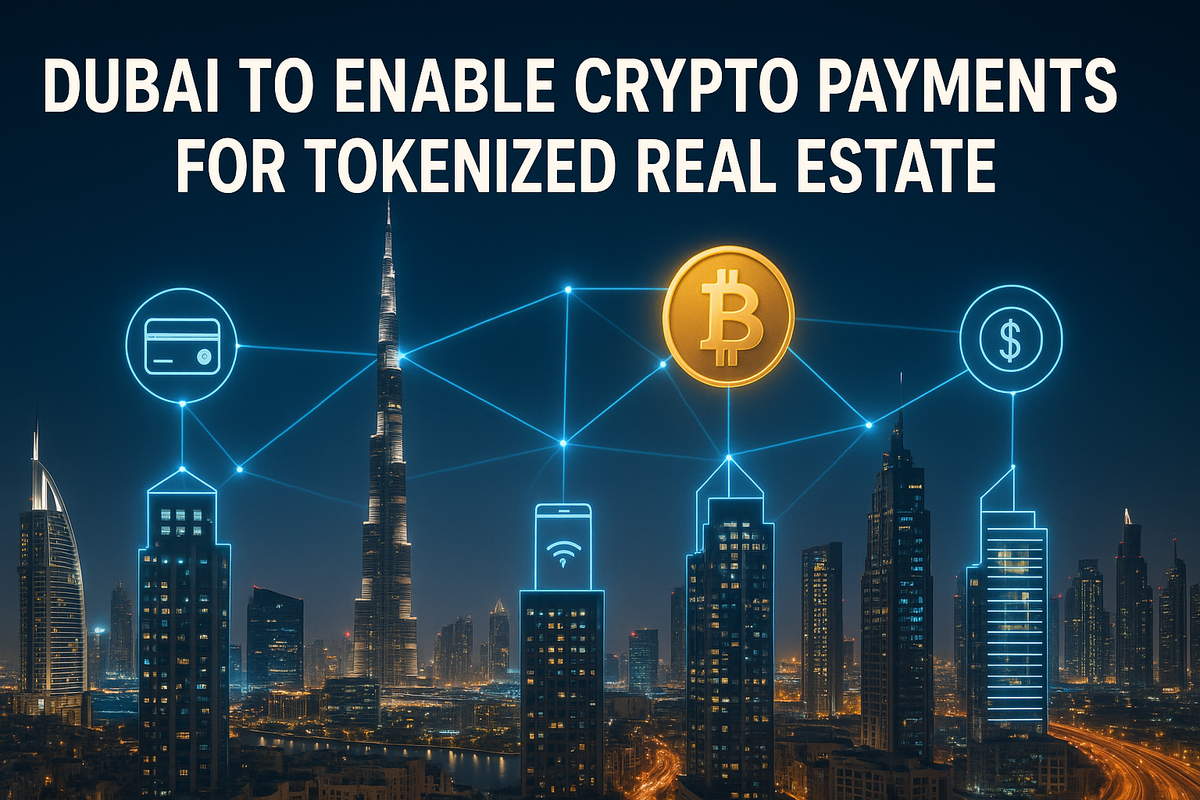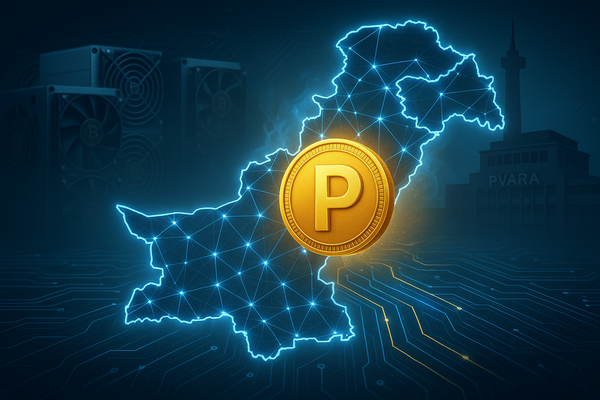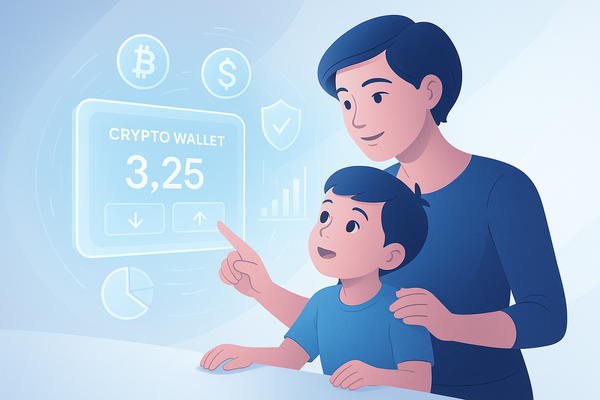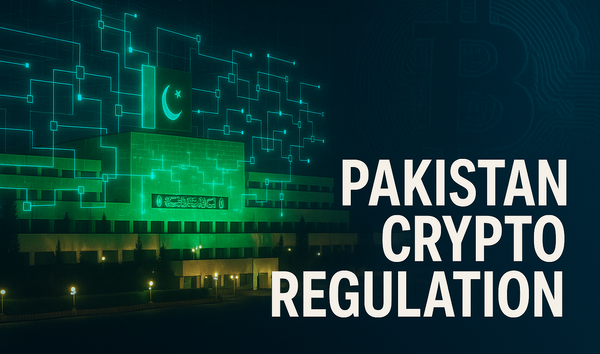Dubai Eyes Crypto Payments for Tokenized Real Estate and Global Investors
Dubai is preparing to take tokenized real estate to the next level. After launching Prypco Mint for fractional property ownership, the city is now exploring crypto-based payments, a move that could redefine how the world invests in real estate.

Dubai’s vision for a fully digital economy continues to gain momentum, this time by merging tokenized real estate with crypto-based payments.
After pioneering the world’s first regulated real estate tokenization platform, Prypco Mint, Dubai is reportedly preparing to enable property investments. The move could mark one of the most significant integrations of blockchain, tokenization, and real-world finance in the region’s history.
From Tokenized Titles to Digital Transactions
When Dubai’s Land Department (DLD) launched Prypco Mint earlier this year, it was hailed as a landmark in the tokenization of real-world assets.
The platform allows fractional ownership of property starting from just AED 2,000, giving both residents and investors the chance to own real-estate tokens backed by government-verified assets.
Initially, all transactions were conducted in UAE dirhams (AED) through verified local channels. But behind the scenes, Dubai’s regulators have been preparing for a much larger leap, the integration of crypto payments as part of Prypco Mint’s upcoming Phase 2 rollout.
The Push Toward Crypto Settlement
In mid-2025, the DLD signed a strategic partnership with Crypto.com to explore digital settlement infrastructure for tokenized real estate.
This collaboration aims to introduce secure custody, on-chain compliance, and potential stablecoin settlement mechanisms, a critical step toward crypto-enabled property purchases.
Industry insiders suggest that Phase 2, expected later in October 2025, could mark the official introduction of crypto payments for real-estate tokens on the platform.
While there has been no public confirmation from authorities yet, multiple reports indicate that Dubai is aligning all necessary regulatory and technological layers to make it possible.
Why Crypto Payments Matter in Tokenized Real Estate
Tokenization alone revolutionized property investment by breaking large, illiquid assets into tradable digital shares. But adding crypto payments introduces a new level of accessibility and liquidity.
Here’s why it’s a game-changer:
- Global Access:
Allowing crypto payments lets international investors participate without complex bank transfers or currency conversions. - Instant Settlement:
Transactions can settle within seconds on-chain, eliminating intermediaries, delays, and unnecessary costs. - True Web3 Integration:
Tokenized assets + decentralized payments = a full-cycle blockchain economy. - Financial Inclusion:
Retail investors, especially in emerging markets, can invest fractionally in Dubai’s real-estate market using digital assets.
Regulation Leading the Way
None of this would be possible without Dubai’s progressive regulatory framework.
The Virtual Assets Regulatory Authority (VARA) and Dubai Financial Services Authority (DFSA) have already established comprehensive rulebooks for Virtual Asset Service Providers (VASPs), AML/KYC compliance, and digital asset licensing.
More recently, the UAE became one of the first nations to adopt the Crypto-Asset Reporting Framework (CARF), setting global standards for tax reporting and transparency.
This clarity has made Dubai one of the top two global jurisdictions, alongside the United States, in providing structured crypto regulation, attracting blockchain firms, fintech startups, and institutional investors from around the world.
A Glimpse Into Phase 2
According to early discussions from DLD officials and partner companies, Phase 2 of the Prypco Mint platform could enable users to purchase tokenized properties using approved digital assets such as:
- Stablecoins like USDC or USDT (to minimize volatility risk)
- Possibly regulated payment tokens licensed under VARA’s framework
Every transaction would likely be settled through licensed custodians, ensuring investor protection and compliance with AML standards.
This model could eventually expand to support cross-border investments, allowing global buyers to acquire fractional shares in Dubai properties directly using crypto.
Why Dubai Is Positioned Ahead
Dubai’s advantage lies in its ecosystem approach, a combination of visionary governance, active regulatory bodies, and strategic partnerships with global crypto players.
While other nations are still debating how to regulate tokenization, Dubai has already:
- Tokenized real estate on public blockchains (XRP Ledger for certain pilots)
- Established dedicated authorities like VARA to supervise digital assets
- Encouraged collaboration between government, fintechs, and private developers
This synergy makes it a testing ground for the next generation of blockchain-based finance, blending real-world assets with decentralized technologies.
The Bigger Picture: Tokenization Meets DeFi
Integrating crypto payments into real-estate tokenization opens the door to DeFi-backed property ecosystems, where tokenized assets could be:
- Used as collateral for on-chain lending
- Traded on secondary markets globally
- Included in yield-generating DeFi protocols
This convergence tokenization + DeFi + crypto settlement represents a blueprint for how traditional finance (TradFi) and decentralized finance (DeFi) can coexist in a transparent, regulated, and borderless environment.
If Dubai successfully launches crypto payments for tokenized property, it will:
- Attract massive retail participation worldwide
- Set a new global precedent for compliant, blockchain-based asset trading
- Strengthen the UAE’s position as a global hub for tokenization and Web3 innovation
In the long term, tokenized real estate could become as liquid as trading stocks — with investors able to move seamlessly between assets, currencies, and even nations, all powered by blockchain.
Dubai’s move to merge crypto payments with tokenized real estate isn’t just a financial innovation, it’s a vision of the future economy.
From government-backed tokenization to exploring on-chain settlement, the UAE is building a bridge between physical and digital value, setting a benchmark for the rest of the world.
While the rollout may still be months away, one thing is clear:
Dubai isn’t just adopting blockchain, it’s building the economy of the future on it.




